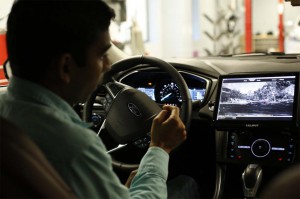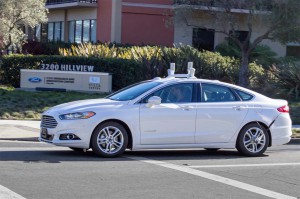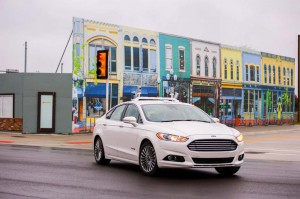California roadways are starting to get crowded with autonomous vehicles.
Even though the first retail self-driving vehicles aren’t expected to roll into showrooms until 2020, at the earliest, a growing number of automakers have begun testing their technology out on public roads. And Ford Motor Co. is the latest to get a permit from the Golden State, one of the first to create a special license for autonomous vehicles.
Starting next month, Ford will start testing a specially modified version of its familiar Fusion Hybrid sedan on the streets near its new Silicon Valley research center. It’s already been using a simulated urban setting, dubbed Mcity, set up by the University of Michigan in Ann Arbor.
Ford joins a long list of automakers who have already been licensed by California, including BMW, Daimler, Honda, Nissan and Tesla. But one of the most aggressive autonomous vehicle testing programs is operated by high-tech firm Google. It has been running a variety of modified production cars, such as the Toyota Prius, and recently began rolling out the first in a planned fleet of 100 custom “Google Cars.”
Ford’s program will be more limited, the maker said. At least initially, it will use just one Fusion Hybrid based out of its Research and Innovation Center in Palo Alto. That facility opened earlier this year with just 15 employees but has rapidly expanded to 100 staff members.

A Ford researchers working on "sensor fusion," bringing a mix of technologies, such as laser and cameras, together to let the vehicle "see."
“We’re attracting top talent from around the world to join our team in Silicon Valley, including employees from local technology companies and universities who want to make people’s lives better by changing the way the world moves,” said Ford CEO Mark Fields during a visit to the center on Tuesday.
(Ford exploring car-sharing, other “multi-modal” alternatives. Click Here to learn more.)
Ford is taking a cautious approach with its autonomous research, in part, to make sure that it is comfortable with the way its technology will perform in real-world settings. The Mcity center in Ann Arbor, Michigan is a detailed mock-up of a real city, complete with stop signs, pedestrian crossings and freeway on and off-ramps. But officials there emphasize that if there’s a problem in testing there’s no risk to the public.
Ford says it will continue to run digital simulations of its technology, among other things creating “virtual interaction(s) between an autonomous car and pedestrians, replicating real-world situations to better understand and develop responses to some of the unexpected things that can happen on the road.”
That’s something that has become apparent during Google’s far more extensive autonomous vehicle testing program. To date, its cars have been involved in at least 16 known collisions, all minor and, according to police, all caused by the other driver. But the crashes have revealed some of the potential challenges manufacturers face in bringing autonomous technology to the real world.
In the latest incident, the Google Car started to make a legal right turn on red but suddenly stopped when its sensors detected another vehicle approaching too quickly. The car behind the Google vehicle didn’t stop, expecting the autonomous car to keep moving. Some of the other crashes have occurred when the Google Cars have stopped aggressively at yellow lights while the drivers behind were prepared to keep rolling.
Google officials have said they now need to learn how to program their autonomous prototypes to take into account human behavior when deciding how to handle an ambiguous situation.
(Mega-supplier Delphi expanding its autonomous vehicle efforts. Click Here for the story.)
California is one of four states that have set up official licensing procedures for autonomous vehicle prototypes. The first was Nevada, though Michigan and Florida have also come onboard. And other states are permitting the use of the technology without official programs. Google also has begun testing its cars near its remote campus in Austin, Texas.
Nissan is the first maker to set a hard date for going public, with it promising to put its first autonomous vehicle into production by 2020. But a study released earlier this month by British research firm Juniper estimates there will be 20 million self-driving cars on the road by 2025.
Significantly, the study suggested that many traditional automakers could take a backseat to new industry players, like Tesla, as well as non-automotive entrants, including Google and Apple, which is believed to be setting up its own vehicle program under the codename Project Titan.
(For more on the Juniper study, Click Here.)



It’s good to see Ford exercising better judgment in going slow to get their AV’s right from the get go instead of killing innocent people with the rush-to-market mentality of most involved in the AV craze.
It’s worth noting that at least two of the Google accidents were the result of improper programming that slammed on the brakes as soon as a traffic light turned yellow, causing a rear end collision. In MI the front car which was the Google car, is at least 50% or more responsible for causing the accident and would be cited accordingly. The lawsuits for AV accidents are going to be many and expensive.
All AV designers and manufacturers have a legal and moral obligation to produce safe, reliable, unhackable, failsafe design AVs that meet federal safety specifications designed for the extreme challenges of AVs. These AVs should only be serviced by properly trained, licensed professionals with full documentation of all service work performed similar to the FAA requirements. There won’t be any pilot to take control of an AV when it is hacked, a sensor fails or the computer crashes and the vehicle goes crazy.